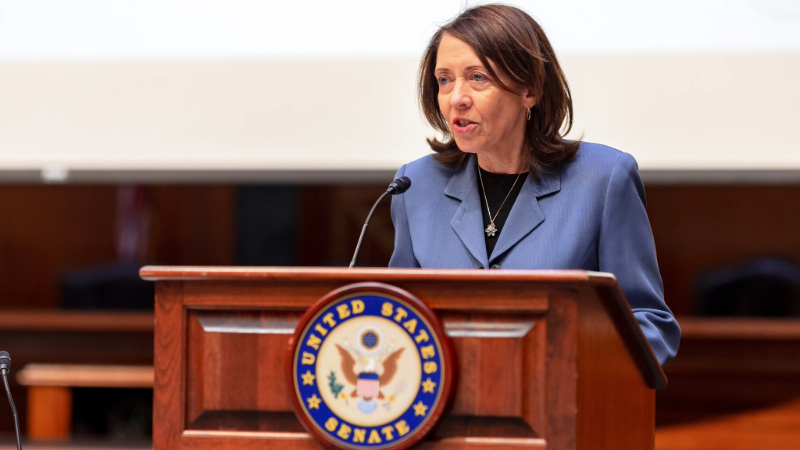
The Senate Commerce, Science, and Transportation Committee voted on Wednesday to approve the bipartisan Future of AI Innovation Act that would provide congressional authorization for the U.S. Artificial Intelligence Safety Institute (AISI), among numerous other provisions.
The bill was approved by the committee on a voice vote, and now heads to the full Senate for further consideration.
The AISI was created earlier this year within the National Institute of Standards and Technology (NIST) with an initial mission scope including advancing research and measurement science for AI safety, conducting safety evaluations of models and systems, and developing guidelines for evaluations and risk mitigations, including content authentication and the detection of synthetic content.
The institute was established by President Biden’s 2023 AI Executive Order, and its continued existence beyond this year remains in some doubt absent congressional action to authorize AISI over the longer term.
Executive orders issued by President Biden – including the 2023 AI Executive Order – are subject to cancellation or replacement by whoever wins the White House in November. Last month the Republican Party adopted a new platform ahead of a possible second term for former President Donald Trump, which vows to scrap the Biden administration’s AI EO. “We will repeal Joe Biden’s dangerous Executive Order that hinders AI Innovation, and imposes Radical Leftwing ideas on the development of this technology,” the platform reads.
Opposition to the 2023 AI order was on full display at Wednesday’s hearing from Sen. Ted Cruz, R-Texas, ranking member of Senate Commerce, who unsuccessfully offered several amendments that would have chipped away at the executive order.
Sen. Cruz derided what he called the executive order’s tasking of NIST with “guiding all other Federal agencies and private industry in developing standards by which to regulate AI,” and said that NIST’s latest AI risk management framework for generative AI cited “extraordinary” risks including misinformation, environmental impacts, and “amplification and exacerbation of historical, societal and systemic biases.”
Speaking of the Future of AI Innovation Act approved by the committee on Wednesday, the senator said, “this bill takes the authorities and directions that Biden gave to NIST and codifies a radical AI Safety Institute run by White House political officials and members of big tech.”
At least one amendment to the bill offered by Sen. Cruz did win committee approval. That provision would require the White House Office of Science and Technology Policy to issue a statement to Federal agencies that their AI policies should not include guidance that one race or sex is inherently superior to another, or that the United States is fundamentally racist or sexist.
Outside of Sen. Cruz’s objections, the bill enjoys significant bipartisan support with its sponsors including committee chair Maria Cantwell, D-Wash., and Sens. Todd Young, R-Ind., John Hickenlooper, D-Colo., Marsha Blackburn, R-Tenn., Ben Ray Luján, D-N.M., Roger Wicker, R-Miss., and Kyrsten Sinema, I-Ariz.
“The Cantwell-Young Future of AI Innovation Act builds on recommendations of the National Artificial Intelligence Advisory Committee to encourage strong public-private collaboration, drive innovation and support U.S. competitiveness,” Sen. Cantwell said.
“It codifies the AI Safety Institute at NIST that is already developing voluntary guidelines and tests for advanced AI models and systems, and will gather leading private sector and government experts to promote voluntary standards,” she said. “Our bill will also create joint testbeds with our national laboratories to assess the most complex AI models, create new materials for advanced manufacturing and make new scientific discoveries for the benefit of the U.S. economy.”
“The Future of AI Innovation Act is critical to maintaining American leadership in the global race to advance AI,” added Sen. Young. “This bipartisan bill will create important partnerships between government, the private sector, and academia to establish voluntary standards and best practices that will ensure a fertile environment for AI innovation while accounting for potential risks.”
“One of my top priorities for federal AI policy is to ensure these technologies are developed in a manner that reflects our democratic values and supports innovation continuing to flourish in the United States, and today’s vote represents an important step forward in that effort,” Sen. Young said.
The Senate panel also advanced seven additional AI bills, including the CREATE AI Act; the NSF AI Education Act; the VET AI Act; the AI Research, Innovation, and Accountability Act; the TEST AI Act; the Small Business AI Training Act; and the AI Public Awareness and Education Campaign Act. The latter three bills were largely uncontroversial, passed in block by voice vote.
